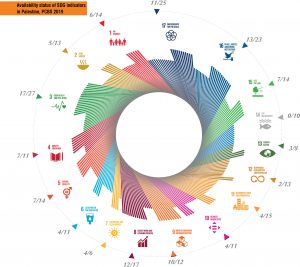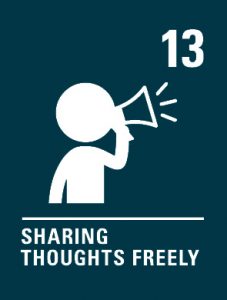 Statistics are a powerful tool to drive change for the world’s most vulnerable children. The smart demand for, supply, and use of data and statistics can improve the lives and well-being of children. When the right data and statistics are in the right hands at the right time, decisions can be better informed, more equitable, and more likely to protect children’s rights. The effective use of data and statistics can help us not just track results for children but also shape those results with better insights about what’s working, what’s not, which children are thriving, and which children are being left behind. Data and statistics hold more potential than ever before to shape the lives and living conditions of children.
Statistics are a powerful tool to drive change for the world’s most vulnerable children. The smart demand for, supply, and use of data and statistics can improve the lives and well-being of children. When the right data and statistics are in the right hands at the right time, decisions can be better informed, more equitable, and more likely to protect children’s rights. The effective use of data and statistics can help us not just track results for children but also shape those results with better insights about what’s working, what’s not, which children are thriving, and which children are being left behind. Data and statistics hold more potential than ever before to shape the lives and living conditions of children.
The United Nations Sustainable Development Goals (SDGs) are targets for global development adopted in September 2015, with targets set for 2030. All countries of the world have agreed to work towards achieving these goals. There are 44 indicators across 10 of the SDGs that are relevant to children. There is a national system established to track progress against the SDGs in Palestine, and this requires national partners to generate information on a regular basis. The Palestinian Central Bureau of Statistics (PCBS), as provider of Palestine’s official statistics, is leading the development of data requirements to effectively monitor and review progress indicators in cooperation with the SDGs national team headed by the Prime Minister’s Office. PCBS also represents Northern Africa and Western Asia at the High-level Group for Partnership, Coordination and Capacity-Building for statistics for the 2030 Agenda for Sustainable Development (HLG-PCCB).
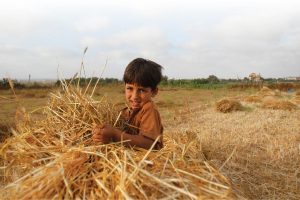
The first SDG target (SDG1) is to eradicate extreme poverty by 2030, including to reduce by half the total number of people living in poverty, with a specific target on children. In 2017 almost one in three people in Palestine (29.2 percent) were living below the poverty level, with 53 percent of individuals in the Gaza Strip found to be poor compared to 14 percent in the West Bank. Moreover, 34 percent of individuals in the Gaza Strip were suffering from deep poverty compared to 6 percent in the West Bank. The number of children living in households with consumption poverty was 645,000 in 2017, equivalent to 31 percent of children (14 percent in the West Bank and 53 percent in the Gaza Strip).*1 This means that Palestine has a long way to go to eliminate poverty and meet the SDG target.
SDG3 on health includes a target to end preventable deaths of newborns and children under 5 years of age. In Palestine, the rate of children under age five dying before their fifth birthday has fallen from 33 out of every 1,000 live births for the period from 1990–1994*2 to 22 per 1,000 live births in 2014.*3
SDG4 on education includes a target that all children have access to quality pre-primary education to prepare them for primary school. According to the Population, Housing and Establishment Census of 2017, 54 percent of children aged 3 to 5 attend early childhood education programs in Palestine, and the rate of children from ages 5 to 17 who are engaged in education is 87 percent. However, the rate of children between 6 and 17 with disabilities who are not engaged in any form of education is 46 percent – an alarming rate that shall not be overlooked.
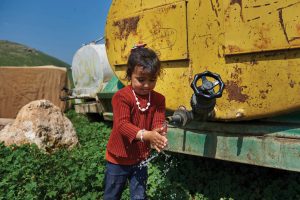
All of these are essential statistics on the Palestinian population which require investment to generate data at a level of confidence and quality for them to be used for policy and decision-making. Realizing the importance of national ownership to achieve sustainable development, the Palestinian government has committed to engaging everyone in the seizing of opportunities ahead. Palestine’s National Policy Agenda, “Putting Citizens First,” is consistently aligned to the 2030 Agenda and its SDGs.
One key data-generation exercise is the Multiple Indicator Cluster Survey (MICS), which provides detailed information on children, women, and households. Data collection for the sixth round of the MICS survey will occur across Palestine between December 2019 and January 2020. Data will be gathered from over 10,000 households throughout the country. This sample size was calculated to ensure statistical validity and representation across all governorates in Palestine.
The MICS has been a global tool for the last 20 years, and since the 1990s, close to 300 surveys have been carried out in more than 100 countries. MICS now facilitates collection of up to 200 indicators and has become a key source of data on child mortality, child protection, early childhood education, and child health and nutrition. In addition to its role as a data-collection tool for monitoring the progress towards national goals to promote child welfare, MICS provides valuable data for the SDGs.
In the context of the State of Palestine, with the protracted crisis and risks such as seasonal flooding, using data to understand vulnerability at the local level is also essential. PCBS is analyzing existing data using modern tools such as mapping and geographic information systems to understand the situation and the needs of communities at the governorate, district, and locality levels. For example, PCBS has just issued a series of analytical maps based upon the census, including Educational Attendance Rates by district; and Number of Children with Disability Not Enrolled in Education by district.
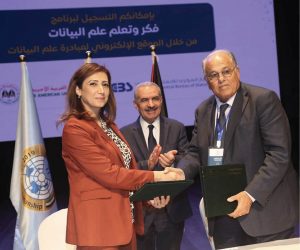
Our children today will be the data producers and users of tomorrow, so we must equip them to explore data and statistics for the future good of all Palestinians. Whether we like it or not, the world is changing, and data is being generated all around us. We are faced with new technologies and movements that include artificial intelligence and machine learning which can harness the data we all generate from social media, telephones, and the internet. To harness this data revolution, on the occasion of this year’s World Statistics Day on October 20, PCBS in partnership with the Arab American University launched the “Data Science Initiative,” which is the first of its kind in Palestine. The initiative is an open invitation to all stakeholders and includes four main projects: the Data Matters Festival – “A One-Day Journey to Core Data Science Skills”; Think Data Science Program, Data Science for Executives and Leaders; Data Science for Schools – “Schools without Walls”; and Data Science Society of Palestine. The Schools without Walls project seeks to embed data science skills in the curricula of schools and universities to equip students with data intuition and motivation to engage in data science. More details on the initiative is available at http://www.datascience.ps/.
Within the National Strategy for the Development of Statistics there is a special focus on raising the awareness and statistical literacy of data users, including students and children. To achieve this, PCBS and the Ministry of Education have undertaken to host a National Schools Statistical Competition for past two years. This competition gives all 9th-and 10th-grade students across Gaza and the West Bank the opportunity to compete to demonstrate their literacy in the use and understanding of statistics. The competition is based on the PCBS website for students (http://www.pcbs.gov.ps/students) which provides statistical data on various topics in an attractive and interactive way. PCBS has also created a special interactive portal for school children within its main website which, in a child-friendly manner, seeks to raise awareness on the use of statistics. The portal is accessible at http://www.pcbs.gov.ps/students/index.php.
These initiatives are the stepping-stones that lead to improving the lives of our children by preparing them for their future in a changing world, and to supporting the next generation of Palestinians to understand the needs, vulnerabilities, and systems that we can draw upon to improve our children’s vital statistics.
*1 The Household Expenditure and Consumption Survey, 2017 (PECS).
*2 The Palestinian Demographic and Health Survey, 1995.
*3 The Palestinian Multiple Indicator Cluster Survey, 2014 (MICS).


